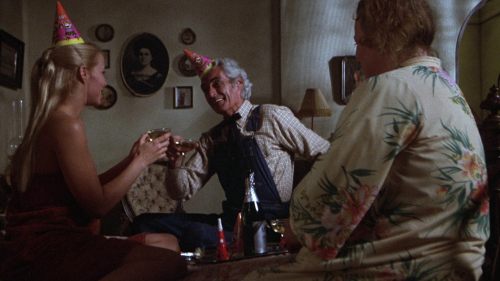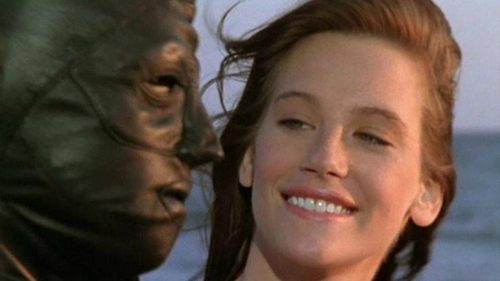A Case For Greatness: MEET JOE BLACK
Classics never die, but they seldom get replaced. Cinema is populated with enduring, venerated works of art that deservedly adorn list after list, but those lists are rarely updated, and less often expanded to include new, equally worthy entries. Organizations that give out annual awards are constrained not only by the limitations of formatting, but perspective - they can’t anticipate which film will survive the buzz of its initial acclaim or success and become part of the cultural firmament. And then there are just certain films or even genres that too infrequently receive the critical attention they deserve, are too obscure to break through to bigger audiences, or just aren’t taken seriously enough to merit consideration alongside the ones we “all” already know we love or respect. A Case For Greatness, this series, tries to argue for, and to champion, forgotten or underappreciated films in a variety of genres that may be worthy of being called “classics.”
No fewer than five people have told me in the last week that the teaser trailer for Star Wars Episode I - The Phantom Menace first appeared on the film Meet Joe Black, which celebrates its 20th anniversary on November 13. There’s something sort of delightful about such a piece of trivia - even if it weren’t Star Wars-related, it’s fun to have those permanent, visceral associations between certain experiences and movies or songs - but it’s much to my disappointment that none of those same people followed up their recollection with a single word, good or bad, about Martin Brest’s film. Because the quiet, beautiful three-hour drama was, and is, one of my favorite movies of all time, an unhurried triumph of introspection about what makes us human, filtered through a loose remake of the 1934 high concept film Death Takes a Holiday. Twenty years later, it remains alternately forgotten or unfairly maligned, despite the fact that its age - and our own advancing years - have only given breathing room to its exquisite technical bona fides, and enhanced its resonance as a meditation on life from the unlikely perspective of Death.
Anthony Hopkins plays Bill Parrish, a billionaire media tycoon who, on the eve of his 65th birthday, is considering a merger between his news corporation and another. As his eldest daughter Allison (Marcia Gay Harden) plans an elaborate, no-expense-spared birthday party for Bill, seemingly oblivious to his disinterest, her younger sister Susan (Claire Forlani) mulls a future with Bill’s right-hand man Drew (Jake Weber), a handsome go-getter pinning his professional future to the sale of Parrish Communications. Bill, distracted by thoughts of his own mortality, encourages Susan to seek a suitor with whom she feels true passion: “I want you to levitate,” he tells her. “I want you to sing with rapture and dance like a dervish.” But the person who most clearly hears Bill’s advice is the one he’s most afraid to encounter - Death, who is impressed by his poise, intellect, and perspective on the people and the world around him.
During a detour into a coffee shop on the way to work as a resident at a local hospital, Susan crosses paths with a handsome, charming young man (Pitt), whose cheerful demeanor and thoughts about relationships echo some of her father’s sentiments. It’s not just a romantic comedy meet-cute; it’s the sort of cosmic convergence of personality and timing that happens woefully infrequently in life, but makes for great fodder in movies - but fundamentally, feels real and believable. But immediately after they reluctantly part ways, the young man is fatally struck by not one but multiple cars. It was an almost comical payoff to the scene back in 1998, especially since it happens to Brad Pitt, but it takes on a melancholic resonance in the face of Bill’s reverberating advice to grab onto the things that mean the most, because they will not last forever - and often disappear quickly. This is the body that Death claims as an earthbound host when demanding that Bill play shepherd and guide through the world of the living in exchange for a few more days above ground. Without recourse, Bill dubs Death “Joe Black” and halfheartedly introduces him first to his family - including a stunned Susan, who never got his real name - and then Bill’s board of directors, who begin to worry he’s being manipulated by this mysterious stranger.
Hopkins’ performance is almost too nuanced for the film’s length (which still seems to be the main criticism lobbied at it); Bill’s contemplation of his own mortality seems like a reasonable anxiety, at least enough for the story of a man on the precipice of retirement. But a more granular view of the film reveals that its focus is itself more nuanced, and detailed, than just on one man contemplating the abyss. It’s an important reminder of the power and value of the relationships we share with others, perhaps most vitally with our family, but even those further out on its periphery, like Quince (Jeffrey Tambor), Allison’s daffy husband who dumb-lucked his way into a billion-dollar family. And it’s a story about love - not to be confused with a love story - as Joe, in discovering about the world of the living, develops an infatuation with Susan, and she develops one with him in return.
Death’s journey is a fascinating one, amplified by a performance by Pitt that utilizes every ounce of his natural charisma in a wonderfully understated way. (Indeed, only somebody as naturally affable - and, sure, irresistibly beautiful - as Pitt could successfully portray a character described by Susan as “diffident in the most seductive way.”) Its experiences begin with the quotidian - learning about clothing and food (peanut butter never seemed so good) - and he quickly moves into more complex interactions with other humans, notably Drew, whose frustration at Joe’s detached curiosity quickly grows into open hostility. Visiting Susan’s hospital, Joe encounters a Jamaican Woman (Lois Kelly-Miller) who is the first and only person other than Bill who sees him for who he really is, underscoring not only the inappropriateness of Death’s presence, but forcing it to consider, if only briefly, the pain, both physical and emotional, felt by those whose lives it claims. Death’s self-absorption, and maybe self-pity, prompts its little vacation, but through Joe it soon realizes that the people it encounters - as all will inevitably - are experiencing an important, or maybe the most important moment in their lives.
But Death also inadvertently gets itself into trouble by choosing as its physical form the young man that Susan by chance met in the coffee shop. Prompted by that magical meeting, she quickly falls for Joe - the movie takes place over the course of only a few days - and Death comes to believe it’s capable of reciprocating, and decides it will pursue their relationship. This is where Bill’s journey becomes so vital, as he points out to Joe that what he’s experiencing is not only not love, it’s not even something that he himself cultivated; rather, it’s the residual affection that Susan felt for that poor young man, now filtered through Death’s serene, sincere curiosity. What was a short detour, a holiday for Death has turned into a more profound life lesson - for it and for us - about both the importance of simple everyday pleasures, and the honesty and vulnerability that forges our deepest and most lasting relationships. And in the discovery of both, the film observes how love in all of its forms and loss are inextricably intertwined, lending substance to experiences mundane and transcendent in equal measures.
I suppose it’s easy to grow impatient with Brest’s film since it does not hurry towards these revelations, and allows the audience to experience them in much the same way the characters do. But the filmmaker accomplishes something truly special and unique with Meet Joe Black that, unfortunately, seems to fail to be recognized even today. It’s a movie for adults, tackling a serious subject through a potentially silly conceit that it approaches with suitable gravity and sincerity; and it encourages sentimentality in a direct way while somehow avoiding treacle. It is both a movie about a man reaching the end of his life and reflecting with warmth and gratitude, and one about a young woman discovering the life that she has yet to experience, nurtured by a father who encourages her to live it fully and passionately. For Death, and for us as the audience, it’s a movie about the way we look at the life we hope to live, and the meaning that it holds, along with what we can derive from it, when we look back at what we’ve experienced.



